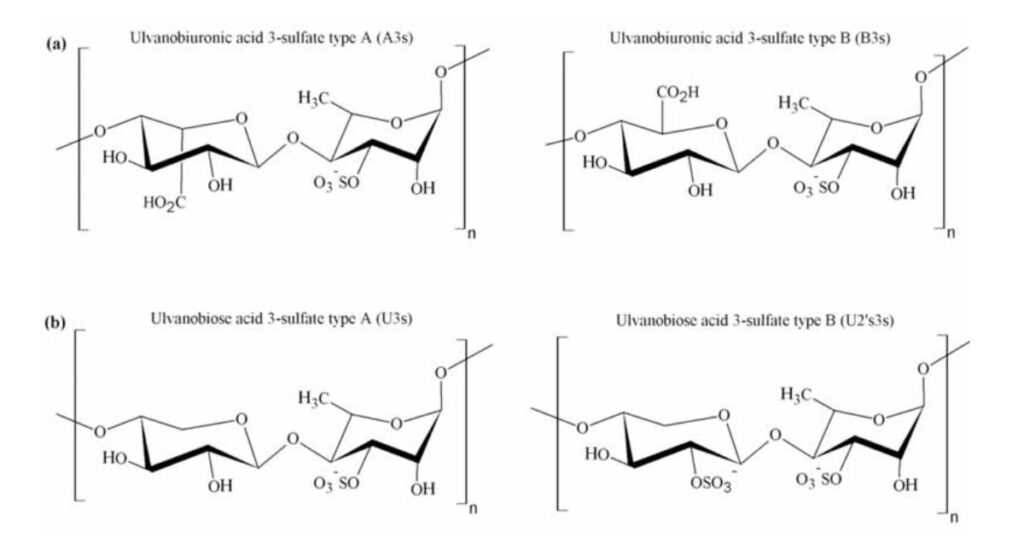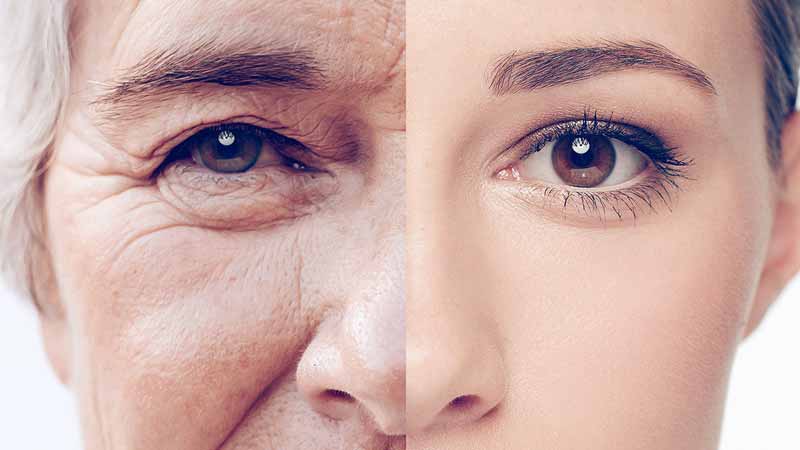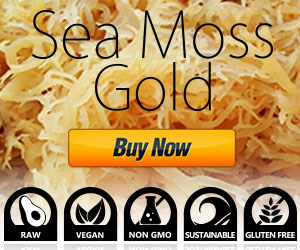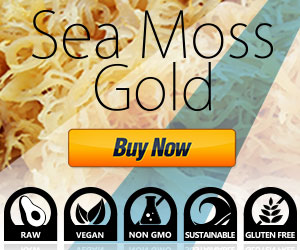Let’s cut to the chase on the topic of seaweed collagen benefits. First up, let’s be clear that there is no collagen found in seaweeds to date. There are some microalgae which have been found to contain amino acids, but the quantity is so low that it has been commented on as being unviable for production purposes.
To make things easier to digest this content for those who are holding on to the ideal that seaweed does in fact contain collagen, I’ll continue to use the words seaweed collagen benefits in this article from time to time.
However, keep in mind that I’m really going to be focusing on how through seaweed there are collagen stimulants which provide certain benefits to the human body.
Table of Contents
If there were collagen in seaweed, the logical connection would be that seaweed collagen benefits your health in a number of ways that animal based collagen struggles to. Now, this statement is essentially correct from the perspective that seaweed contains constituents that are very good are stimulating human collagen production.
And that animal sourced collagen consists of amino acid stands that are typically too big when used as a topical application to be of any real benefit to the skin. They are also more difficult for the body to put to good use when ingested, which is why they are broken down into peptides. This improves their bioavailability.
As a means of stimulating collagen production, certain seaweeds are highly effective at supporting stronger and healthier:
- Muscles, ligaments, cartilage and connective tissue 1
- Eyes, organ function and digestive health, and 2
- Hair, skin and nails to name a few 3
As we dive deeper into the topic of sourcing collagen stimulant benefits from seaweed, you’ll begin to see that this humble, often underrated marine vegetable, may well unlock a multitude of benefits for our planet in the years to come.
One thing is for sure; you’re not going to learn less!
Did You Know there are Different Types of Collagen?
Collagen has been hyped up by the media for some time now. It’s used in cosmetics and consumed in pills, lotions, potions, and powders. But did you know that there are different types of collagen?
Depending upon the type of collagen there will be different resultant outcomes. Some types of collagen are more suited to supporting skin health, while others are more effective at supporting organs and connective tissue.
To date there have been some 28 different types of collagen identified. 4
We will take a closer look at some of these a little further on.
Hey, you might also want to check out:
- The Number 1 Truth Behind Collagen in Plants
- 3 Solid Facts About Collagen in Seaweed
- 17 Best Collagen Sources for Vegans
What is Collagen?
Before we get too excited answering all the questions listed in the Table of Contents, let’s get back to basics. What is collagen?
Collagen is a protein found throughout the body which are made up of 19 amino acids. Approximately 85% of the human body is made up of collagen types I, II, and III. 5
These proteins are used by the:
- Muscles
- Ligaments
- Tendons
- Cartilage
- Bones
- Blood
- Teeth
- Eyes
- Hair
- Skin, and
- Organs.
So, in short, collagen is essential for optimal health. Collagen protein provides the building blocks that make our bodies function more effectively.
Think of collagen protein as the glue that holds our muscles and bones together. It provides the structure to our tendons and joints. The protein protects our organs and strengthens the whole body.
Cosmetics companies have been adding collagen to their products for many years now. Topical application has been marketed to show that it helps with slowing down the visible appearance of the aging process.
This has been predominantly through promoting plumpness and skin elasticity in the skin. Collagen in this sense is sold to us as making us look and feel younger.
The Scary Thing About Collagen
The biggest challenge we have is that each part of the body needs a different type of collagen to work effectively. After the age of 20 to 25 years old, depending upon the research you’re looking at, our bodies stop producing collagen type I. 6
So we need to consume it in our diets, or find an effective way of stimulating it.
To make matters worse, our lifestyles may be speeding up the aging process.
People who expose themselves to an unhealthy diet, have too much sun exposure, consume excessive amounts of alcohol, and smoke, are at risk of depleting their collagen stores faster! 7

Seaweed Collagen Benefits are Essential for Good Health
As mentioned before, the primary source that we can get collagen from is animals. But that doesn’t mean that this is your only option for looking and feeling great!
Sea vegetables contain copious amounts of collagen-supporting constituents. There are lots of seaweed collagen benefits where you can look after what you already have rather than turn to animal sources of collagen.
Let’s take a closer look at how collagen supports a healthy body.
Benefit 1 – Collagen For Your Skin
The most publicised and well-known benefit of collagen is the effect it has on our skin. The mainstream media has told us that cosmetics containing collagen will improve the appearance of our skin.
When you use skincare products containing collagen, it is suggested that your skin will become more vibrant, glowing, healthy and youthful looking. This is because collagen promotes elasticity in the skin.
As we get older, and levels decrease, the skin becomes dull, loose, and in some cases starts to dry out. Of course, this is all subject to how well somebody takes care of their skin and body.
Pro tip: What you do to look after what you have on the inside matters!
One of the ways that we can take better care of our skin is to topically apply collagen-stimulating products to the dermis of the skin. However, not all of these add any proven value. So it’s a case of finding the data and checking it for yourself, or, go with your gut. Your call.
By consuming collagen protein in a balanced diet, and using collagen-stimulating products topically, you could see an improvement in the elasticity of your skin in as little as four weeks according to most cosmeceutical manufacturers.
A 2014 study revealed that consuming collagen can significantly reduce the appearance of wrinkles and fine lines in as little as four to eight weeks. 8
Other Seaweed collagen-stimulating benefits are the naturally occurring anti-bacterial and anti-viral properties that kill germs on the skin. All the nutrients and minerals are then absorbed into the skin, which starts the healing process. 9

Benefit 2 – Cellulite Reduction
Cellulite naturally occurs in our bodies. Although we consider cellulite to be unsightly, there is no need to be concerned. It is a natural part of the aging process. However, studies have shown that we may be able to reduce the appearance of cellulite. 10
You may have heard of dermatologists, skin experts, and beauty clinics promoting seaweed wraps and masks. This is because the seaweed contains collagen stimulating properties which help rejuvenate the skin. 11
When this specific seaweed is applied directly onto the skin, it targets stubborn cellulite. The collagen production is supported and helps to improve the elastin in the skin, and burns the fat which reduces the cottage cheese appearance of cellulite. A 2019 study showed that collagen protein improves the improvement in skin texture and firmness. 12
Benefit 3 – Joint and/or Muscle Pain
As we age, some people may experience aching, pain and stiffness in their joints and muscles. This is due to weakening cartilage which has deteriorated with age. 13
The symptoms of Arthritis is due to the reduction of the mucous membranes between the bones and inside the joints. Consuming collagen is reported as being effective at reducing or even reversing the symptoms caused by Arthritis.
In a 1993 study, where participants experiencing rheumatoid arthritis were asked to take collagen supplements. They experienced a reduction in inflammation and pain. Some of the participants reported remission of their rheumatoid arthritis. 14
Furthermore, a 2009 study of participants with osteoarthritis were asked to take collagen supplements. This resulted in a 40% decrease in osteoarthritis symptoms. 15
So if you experience joint and/or muscle pain, it may be worth talking to your trusted Doctor or Nutritionist about consuming more collagen supplements or increasing your foods capable of stimulating collagen production.

Benefit 4 – Gut Health
As we dive deeper into the seaweed collagen benefits we need to consider what happens on the inside with regards to our digestion.
Did you know that your digestive system is made up of large amounts of collagen-reliant connective tissue? Collagen protein supports and strengthens the connective tissue and the lining of the digestive tract. 16
We are learning more and more these days that an unhealthy gut can lead to numerous health problems. People with leaky gut experience inflammatory bowel problems. As a result, acids and parasites can make their way into the bloodstream and affect the way the body functions. 17
A 2016 study showed that people with leaky gut syndrome have lower levels of collagen in their intestines. 18
What is the Best Seaweed for these Benefits?
Sea Moss is my go-to. I have found Irish Sea Moss gel is a great option because it’s easy to consume and is a great source of long-chain polysaccharides. These are great for the gastrointestinal tract as insoluble fibers, and add a source of prebiotics to support healthy bacteria. 19
As a whole, the minerals within Irish Sea Moss can be absorbed by the body quite efficiently, rightfully earning it the title of being a superfood in my opinion.
When prepared properly, Irish Sea Moss has little to no flavour and can be used in lots of recipes.
Frequently Asked Questions
Is seaweed collagen good?
Many people are on the hunt for the best seaweed collagen. The sad fact is that there isn’t actually collagen in seaweed. Seaweeds contain elements that have been able to demonstrate the ability to stimulate collagen production and rejuvenation, but they don’t naturally contain collagen.
Is seaweed collagen good for skin?
Is seaweed high in collagen? No. Seaweed contains no collagen. Collagen is made up of amino acids. Most seaweeds are good for your skin as they are generally mineral dense and contain beneficial nutrients.
What happens if you eat seaweed everyday?
Eating seaweed everyday may be just what your body needs. There are certain seaweed benefits that simply can’t be obtained as easily through other means. However, it is important to make sure you speak with a Nutritionist first as some people can have reactions to seaweed – particularly if you are already allergic to shellfish.
What does seaweed do to your skin?
You may have tried using a seaweed collagen eye mask before. As mentioned earlier, seaweed contains no collagen. However, there are collagen stimulating benefits from using seaweeds of certain types. Some seaweeds are able to help with improving skin moisture and nutrient retention.
Conclusion
We now know that the seaweed collagen stimulating benefits exceed the bovine collagen benefits, primarily because our bodies absorb these better than the longer and more complex animal based amino acids better.
The molecular structure of collagen supporting constituents from seaweed have a suitable bioavailability for humans. Be kind to your body, and be kind to the environment. Seaweeds is a great way to support your collagen production.
References
- “Tendon and Ligament Regeneration and Repair: Clinical Relevance and Developmental Paradigm” – G. Yang, B. B. Rothrauff, R. S. Tuan, 2 June 2014 [PubMed] [Archive] ↩︎
- “Collagen: A potential factor involved in the pathogenesis of glaucoma” – W. Huang, Q. Fan, W.Wang, M. Zhou, A. M. Laties, X. Zhang, 4 September 2014 [PubMed] [Archive] ↩︎
- “5 Evidence-Based Ways Collagen May Improve Your Hair” – L. Streit, 23 January 2019 [HealthLine] [Archive] ↩︎
- “Collagen” – Cleveland Clinic Staff, 23 May 2022 [Cleveland Clinic] [Archive] ↩︎
- “Amino acid composition in determination of collagen origin and assessment of physical factors effects” – M. G. Włodarczyk, L. Kubisz, D. Włodarczyk, 4 July 2017 [PubMed] [Archive] ↩︎
- “Why does skin wrinkle with age? What is the best way to slow or prevent this process?” – S. Obagi, 16 September 2005 [Scientific American] [Archive] ↩︎
- “Factors Affecting Wound Healing” – S. Guo, L.A. DiPietro, March 2010 [PubMed] [Archive] ↩︎
- “Daily consumption of the collagen supplement Pure Gold Collagen reduces visible signs of aging” – M. Borumand, S. Sibilla, 13 October 2014 [PubMed] [Archive] ↩︎
- “Sulfated Seaweed Polysaccharides as Multifunctional Materials in Drug Delivery Applications” – L. Cunha, A. Grenha, 14 January 2016 [MDPI] [Archive] ↩︎
- “Dietary Supplementation with Specific Collagen Peptides Has a Body Mass Index-Dependent Beneficial Effect on Cellulite Morphology” – M. Schunck, V. Zague, S. Oesser, E. Proksch, 1 December 2015 [PubMed Central] [Archive] ↩︎
- “Treatment of human skin with an extract of Fucus vesiculosus changes its thickness and mechanical properties” – T. Fujimura, K. Tsukahara, S. Moriwaki, T. Kitahara, T. Sano, Y. Takema, January 2002 [PubMed] [Archive] ↩︎
- “Beneficial effects of food supplements based on hydrolyzed collagen for skin care (Review)” – M. A. Lupu, G. G. Pircalabioru, M. C. Chifiriuc. R. Albulescu, C. Tanase, 17 December 2019 [Spandidos] [Archive] ↩︎
- “The Age-Related Changes in Cartilage and Osteoarthritis” – Y. P. Li, X. C. Wei, J. M. Zhou, .Wei, 22 July 2013 [PubMed] [Archive] ↩︎
- “New Rheumatoid Arthritis Therapy Shows Promise” – G. Kolata, 24 September 1993 [New Yok Times] [Archive] ↩︎
- “Safety and efficacy of undenatured type II collagen in the treatment of osteoarthritis of the knee: a clinical trial” – D. C. Crowley, F. C. Lau, P. Sharma, M. Evans, N. Guthrie, M. Bagchi, D. Bagchi, D. K. Dey, S. P. Raychaudhuri, 9 October 2009 [PubMed] [Archive] ↩︎
- “Digestive System” – P. Greaves, 13 January 2012 [PubMed] [Archive] ↩︎
- “Leaky gut and inflammation” – MindHealth 360, 2 December 2017 [MindHealth 360] [Archive] ↩︎
- “Increased Intestinal Permeability and Decreased Barrier Function: Does It Really Influence the Risk of Inflammation?” – H. Fukui, 20 July 2016 [PubMed] [Archive] ↩︎
- “Carrageenans: Structure, Properties and Applications” – A. Ali, S. Ahmed, 2019 [Taylor & Francis] [Archive] ↩︎
Last Updated on 2 months by D&C Editorial Team







I love sea moss! It has been so good for my skin and i use it every day to help me look young. My mother put me on to this when she discovered it and i have been told i look 10yrs younger. How often do you need to make a fresh batch?
Hey Amanda,
We make ours about every 10 days. Normally it takes about 10g of dried sea moss and a little under a liter of water for the average batch. This can change because mot all pieces of sea moss are the same, but typically this is the normal ratio. Just keep in mind that if you add more water it is going to be runnier. Keeping it in the fridge once made is really important.
I’ve read a few of your articles here and have a question. Once you put the gel on your skin is it normal for your skin to feel tight?
Hello Melissa,
Thanks for asking. Yes it is. As the gel dries it will cause your skin to feel tighter.
Other than the collagen stimulants being from plants and not animals, what is it about seaweed collagen stimulants that makes it so good?
Hello Joan,
Thank you for asking. This is interesting as plant based collagen stimulants assimilate with the human body more effectively. Studies have shown that collagen strands from animals (bovine) are of a different structure to human collagen, while collagen stimulant constituents from plants are more effective at supporting our existing collagen levels. The images below show the scale of the size of the collagen pores when frozen, and microscopic images of bovine and human collagen fibers.
A, B and C are human collagen fibers, while D, E and F are bovine collagen fibers.
You said in this post that seaweed helps stimulate collagen which helps with reducing cellulite. Is it because the collagen stimulation from the active parts in seaweed is smaller than the collagen in animals like in the picture above? I don’t really get how this works.
Hello Helen,
Thank you for your question. The collagen stimulants from plant based sources are a smaller structure than bovine collagen, and so, they are able to assimilate, stimulate, and fit into the human matrix strategy better.
Think of it this way, you don’t get a smooth finish when you try to fill a hole with big rocks. If you use sand instead, the smaller grains are able to fill the hole more evenly and you can get a smoother finish on the top of the hole.
Bovine collagen is a bit like the rocks, it can assimilate with the human body, but not as effectively as plant based collagen stimulants do. So, when you have a plant based source of collagen stimulation, like seaweed, the benefits can include the stubborn areas of cellulite filing in and the matrix rebuilding more effectively. This may take some time depending on the condition of the cellulite, but over time you should see some improvements you are happy with.
How does it feel to use?
Hello Jess,
Thank you for your question. I’ve found that the sea moss gel causes my skin to feel like it is tightening particularly after it dries. It can stay moist for longer if it is applied thicker. I notice this around my eyebrows. When I use sea moss gel I feel like my skin is cleaner and fuller.